
The hospital is one of the toughest work environments, and nurses typically bear the brunt of the heavy lifting. According to Americans, as Gallup surveyed, for 18 years in a row, nursing is considered the most ethical and honest profession in the U.S. They not only play a vital role when it comes to providing healthcare, but nurses are essential members of communities.
The World Health Organization (WHO) decided to designate 2020 as the "Year of the Nurse and Midwife" in light of their contributions in the wake of the COVID-19 pandemic. Nurses are also privy to the ins and outs of how hospitals work. They have increasingly been opening up to share their healthcare experiences while also dishing out information that patients are not supposed to know. Some of these details are fascinating, while others are sad, but they give us an insight into what goes on in medical facilities.
Nurses Rule
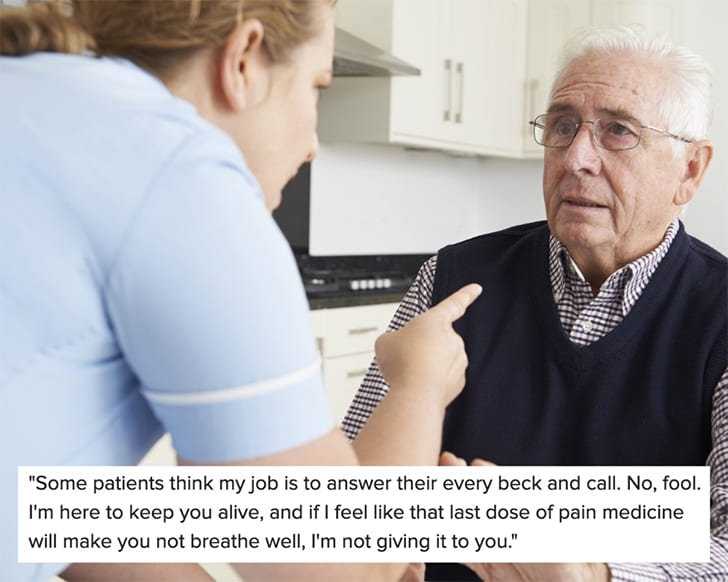
Most of us consider nurses as assistants to physicians and in essence, the people who are at a patient's beck and call. Compared to other healthcare professionals, nurses spend the most time interacting with patients right from when they are admitted up to when they get discharged.
Nurses provide overall care, including overseeing the day-to-day needs of patients who have extended stay in medical facilities. They are also tasked with dispensing medication, while the physician solely diagnoses and treats the illness/injury. A nurse's main focus is to keep patients alive, and that's where it becomes murky when figuring out who is the boss.
They Do The Bulk Of The Heavy Lifting
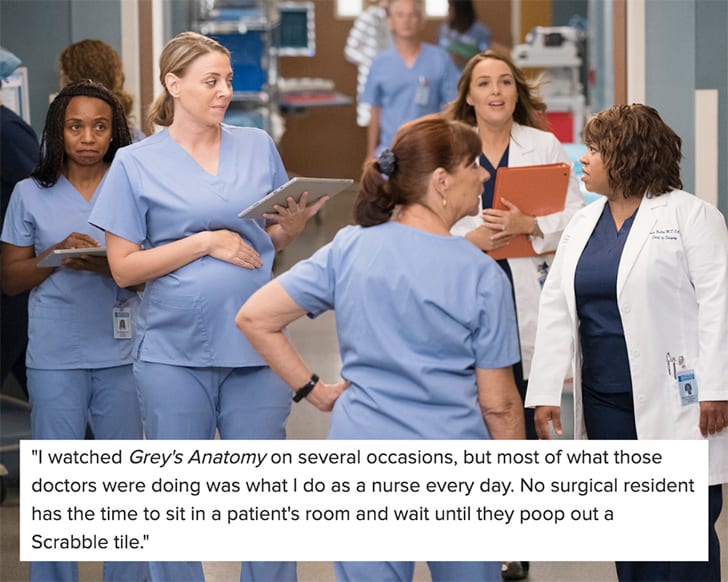
Most of us can be thankful that we haven't had a reason to visit any medical facility recently. That simply means that we are fit and healthy, which in turn hasn't exposed us much to what exactly happens at these facilities. Most of the perceptions we have about healthcare centers are shaped by what we see on TV shows.
Grey's Anatomy is one of those popular medical dramas most of us have watched, but the show's scenarios couldn't be far from reality. Most of the procedures we saw the medics in the show perform are, in real sense, overseen by nurses.
They Inform Doctors About What Needs To Be Done
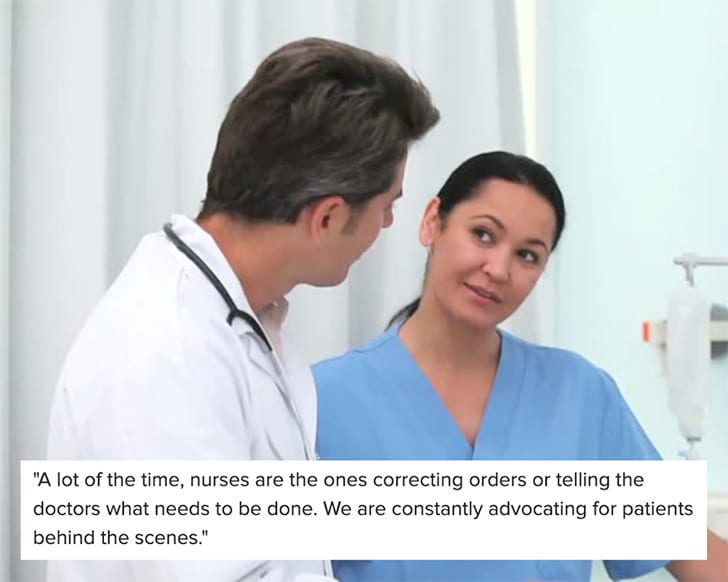
The biggest misconception most of us have about medical facilities is that they are run by physicians who call all the shots. That isn't always the case, even if it's a facility owned by a physician. When dissecting the politics within such facilities, you'll realize that physicians don't have the final say on everything.
Nurses inform physicians what needs to be done, and they also bat for patients behind the scenes. They don't exactly take orders from physicians, and instead, they offer their input on a particular patient's care.
Nurses Are Not Authorized To Diagnose Patients
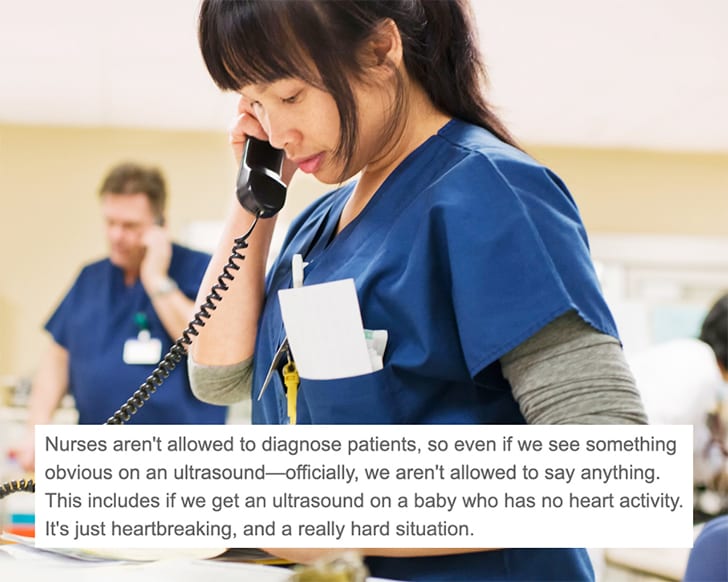
Nurses have the knowledge to diagnose different ailments but they are not authorized to tell patients what they observe in the course of performing preliminary assessments and tests. Nurses typically take vital signs, including blood pressure, pulse, and temperature. If they spot something obvious at this point, they cannot tell the patient anything about their condition.
They are required to alert the physician about the observations they make while performing these preliminary assessments. The physician will then assess the patient, make a diagnosis, and conclude how to treat the illness at hand.
A Flurry Of Names & Faces

You can imagine the number of people who pass through any healthcare facility on a given day. Nurses can become acquainted with patients admitted for long, but they often don't typically remember everyone's name.
Even for return visits, they won't remember you off the bat until they connect the dots based on the details you tell them. Like physicians, nurses need to have good bedside manners, but they have to draw the line when it comes to getting too familiar with patients. That's why you shouldn't take it to heart if they don't remember your name the umpteenth time you turn up at the medical center.
They Hide Their Inexperience
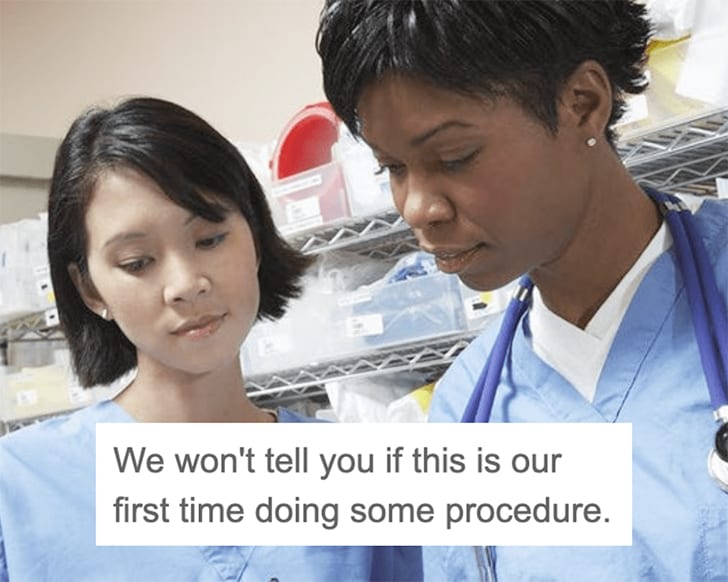
We were all new at our jobs at some point and it's the same case for nurses. However, most people have reservations about having a nurse or physician fresh out of medical school in charge of their care when it comes to health matters. Medical practitioners are tasked with making sure that you always feel like you are in safe hands at all times.
It's the reason why they do not disclose their inexperience and won't tell patients that it's their first time performing a certain procedure. Nurses work hard to land their jobs first, which should put you at ease that they know what they are doing.
Caring Goes Beyond Work
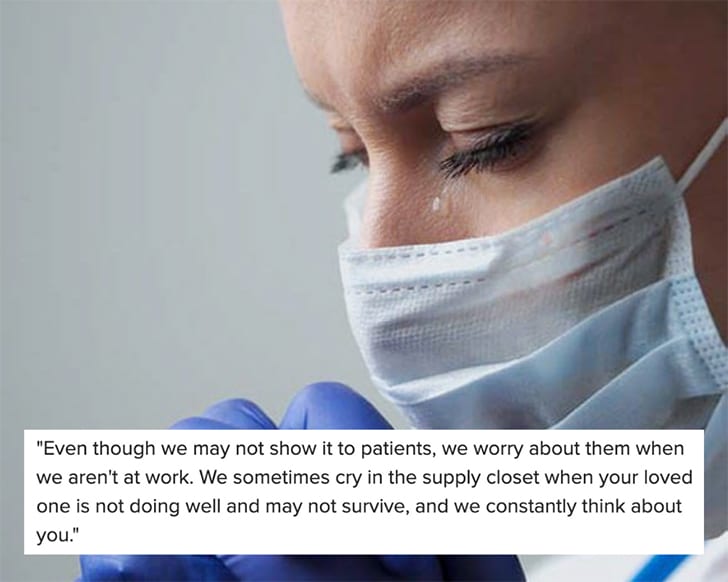
Nurses have to keep a straight face, even when dealing with emotional situations. On that account, they may sometimes come off as cold, but that isn't the case. Nurses care for patients who are fighting to stay alive, and they have to put their feelings aside to provide the best care possible.
In a real sense, they have a tough time leaving the job at work. They are moved by their patients' suffering and pain, and they don't stop worrying about them when they are not at work. Sometimes they are overcome by emotions at work, but they try their hardest to hide it and maintain a positive outlook on the situation.
A Fulfilling Profession

There is always a need for healthcare professionals because they work in various medical centers. Nurses can find work at conventional healthcare facilities, assisted living homes, community healthcare centers, in private practices, and they may also provide at-home care.
Most people would think that is the main motivation for most people to join the profession combined with a lucrative salary. It isn't entirely the case, and most people who join the profession are driven by passion. It is a selfless profession with long and irregular hours, but in general, most nurses report feeling fulfilled by their work.
Nursing Isn't A Gender-Specific Profession
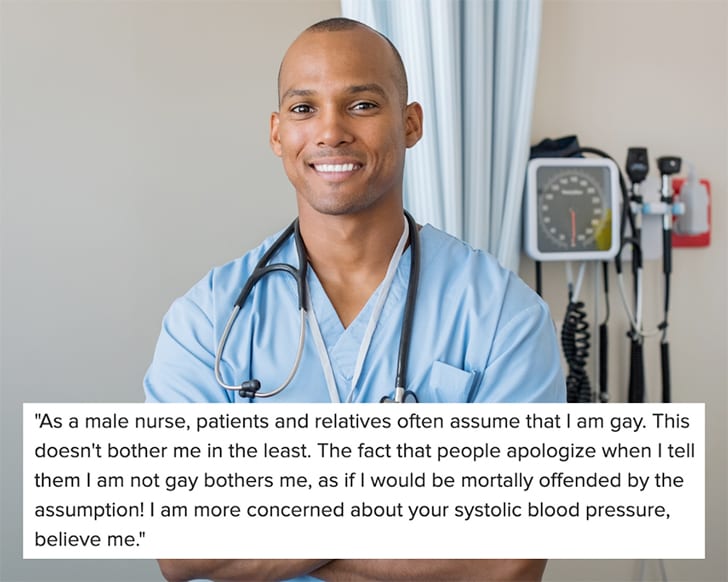
The first known nursing school dates to 250 BCE India, and only male students were allowed to attend the institution back then. As the decades went by, the profession increasingly became associated with women but it is a non-gender-specific profession.
Even now, some people still consider nursing as an un-manly job. Thankfully, there are scores of men willing to overlook gender stereotypes and offer their service to the profession. The other beautiful thing about nursing is that it embraces people of any gender, color, nationality, creed, orientation, and size.
A Ray Of Sunlight Out of The Graveyard Shift
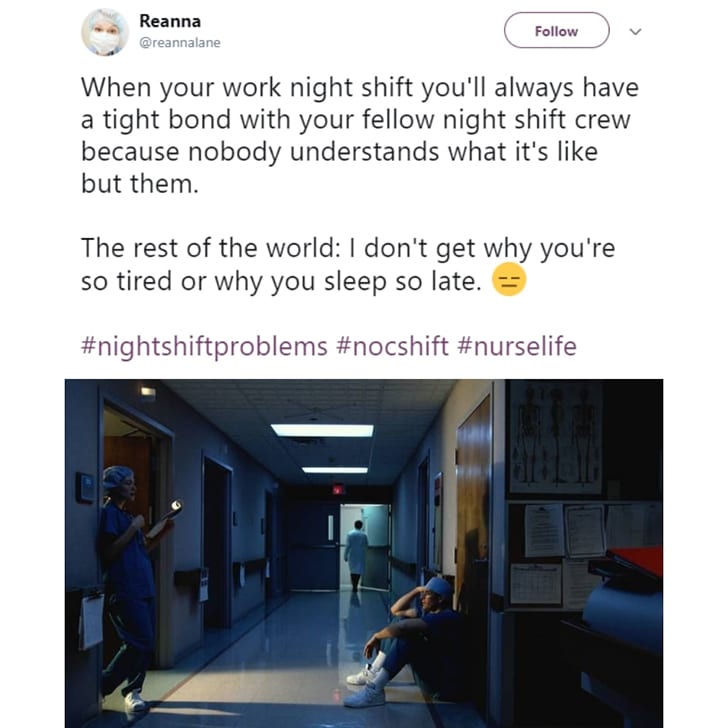
Working a graveyard shift isn't anyone's cup of tea, and nurses who have to deal with ever-changing work hours share the same sentiments. It means that nurses have to run around the clock, as usual, to administer medicine and make sure that their patients are progressing as expected.
The light at the end of the tunnel is the experiences that come out of these shifts. Staff members who work the night shift tend to form tight bonds. It's because they share a mutual understanding of what it's like to work in that environment and make it through the demanding shifts.
Not For The Faint-Hearted
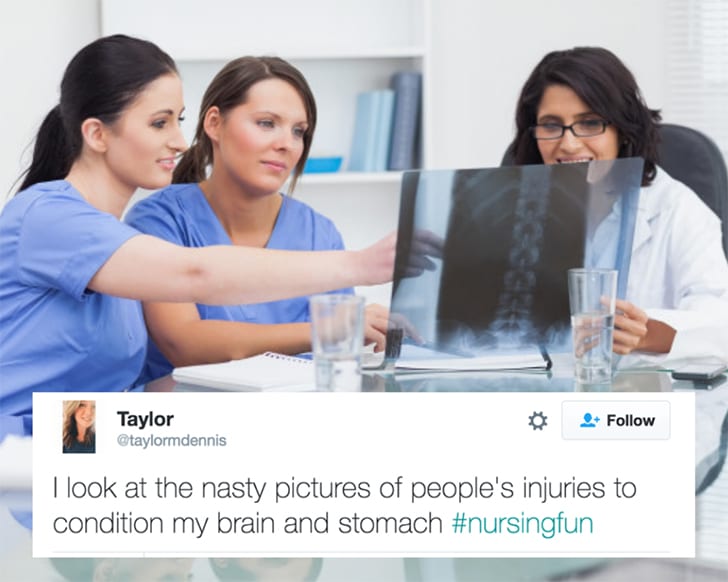
Working at a medical facility isn't for the faint-hearted. Patients come in with all kinds of conditions, and accident victims, in particular, turn up with all kinds of gnarly injuries. Nurses have to have a tough stomach to power through these graphic images in the course of their duty.
Nurses embrace this aspect of their work because it is part of the process of diagnosing and treating the ill. They have to study X-ray images of people's injuries in detail to make the assessments that are necessary for treating the condition.
Nurses Are Not Wait Staff

When you are admitted to a healthcare center and have a problem, the first person you turn to for help is a nurse. The problem is that some patients start treating nurses like their wait staff expecting over-the-top services.
For instance, most medical facilities have a system in place for patients to order their meals. Some patients assume that it's the nurses task to place these orders for them, just like waiters do at a restaurant. Nurses aren't there to deliver your meals but they will do their best to help you recover from your ailments.
They Power Through Sick Days

Nurses are human, and they get sick like everyone else. Their chances of contracting common ailments like the flu is even higher given the environment they work in and the nature of their job. The demanding nature of their job also takes a toll on their general wellness.
If it isn't a life-threatening illness, nurses still report to work and power through the sickness. They won't let you know that they are under the weather, and in case you ask, they'll cover up the stuffy nose with an explanation about fighting with allergies.
They Are Always Moving
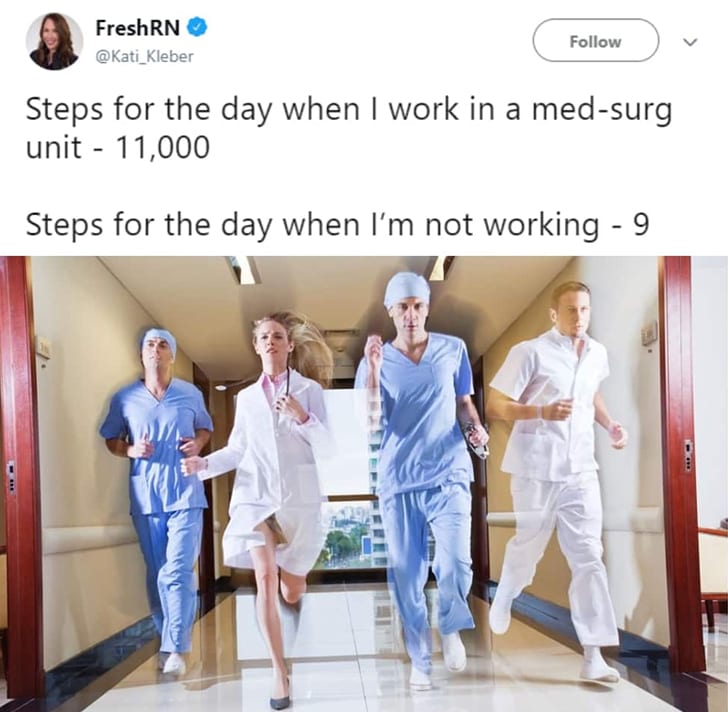
Nurses are always on the move. Even in a small medical center, they have to move from one room to the next, tending to their patients' needs. It's estimated that they average about 11K steps each day, leaving them extremely fit but also exhausted at the end of their shifts.
They are also mostly on their feet for the duration of their shift. It is more tasking in larger facilities where they have patients on different floors or wings. It also explains why they might take time to get to you when you call for their help because they are usually somewhere else helping another patient.
They Have Each Others Back

Working on the foundation of teamwork, nursing is one of the professions where you'll find that people truly have each other's backs. If one nurse is struggling with any aspect, it affects the others, and therefore, others rally behind them and double their efforts to help the person lagging.
Nurses typically find that they are swamped with overtime, and it can get staggering. They will often swap shifts just to make sure that they don't burn out. To charge, nurses are great at scheduling things around the best they can to ensure that they get adequate time to recharge.
They Can’t Chat For Long
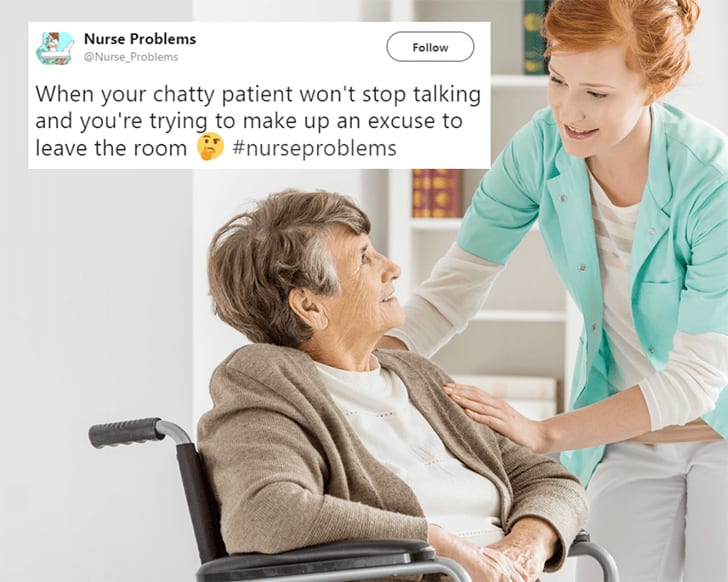
Nurses are happy to offer you a listening ear as long as it doesn't get in the way of their schedule. They handle people from diverse backgrounds and they always encounter the chatty patient who just wants some company.
They soon become great at coming up with excuses to cut conversations short because they have to get on with their day. It doesn't mean that they don't want to talk but when you think of it from the point of view that they have several other patients to look after it makes sense.
Adjusted Sleep Patterns & Recovery Time
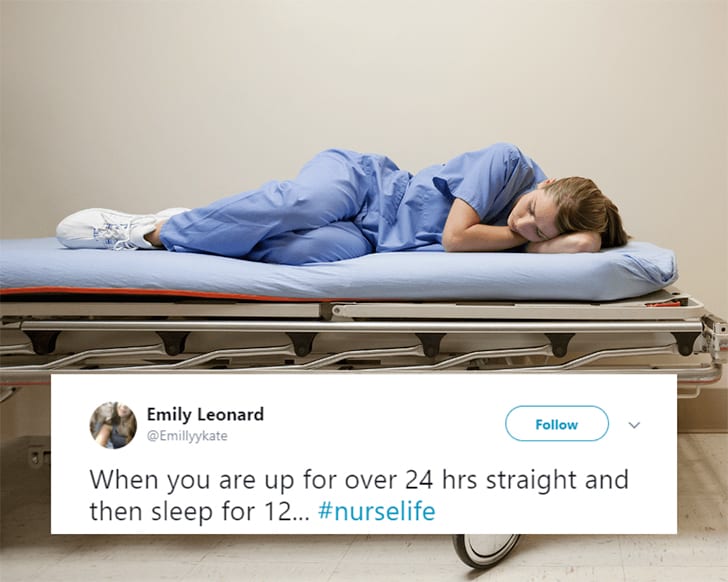
The daily recommended minimum snooze time we should aim for is eight hours. That isn't nearly possible for nurses who have to work around their unpredictably long schedules. In some cases, nurses can clock 24 hours at work.
They make up for it by sleeping more, that is if their bodies have fully adjusted to their schedules. We've heard of nurses working three days a week, but this is dependent on the medical facility where they are employed. Well, they need about four days of recovery to recharge for the next week.
The Scrubs Conundrum

Scrubs are the signature outfits we all associate with the medical profession. They look comfortable and practical for the nature of their job. However, nurses would say otherwise because they don't adapt to changing temperatures that well.
They can leave you sweating buckets in the summer, but when winter comes around, they don't offer the warmth you need to make it through the cold days. It doesn't help that they can't switch their wardrobe to suit the seasons. Their only resort is to layer up during the winter months and keep things light during the summer.
Irregular Eating Hours

The irregular hours that nurses have to adapt to affects their overall life. Not only is their sleep pattern affected, but they have to switch up their eating schedule. It may not sound like a big deal, but it can have serious physical repercussions.
They can go for long periods without eating, and it does affect their behavior making them irritable, angry, and even borderline hostile. It also makes them prone to get fatigued easily. It is due to low blood sugar syndrome and it is fixable simply by eating at the right time.
It's All About Teamwork
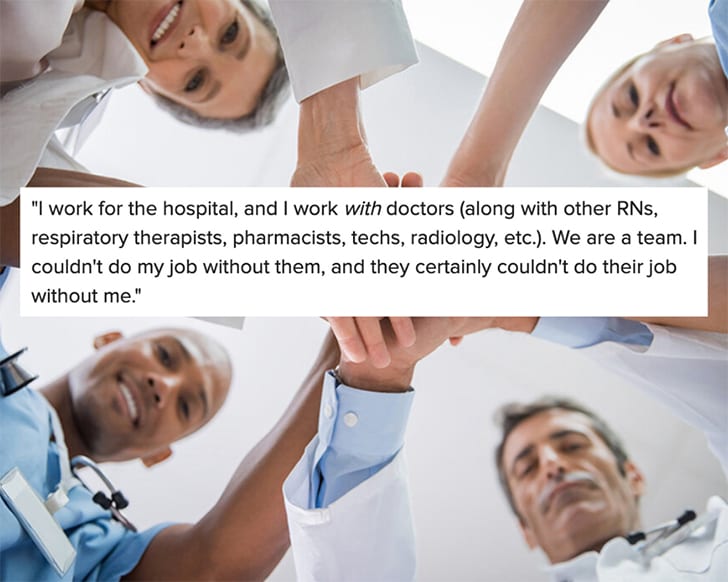
Medical facilities are staffed with nurses, physicians, pharmacists, laboratory technicians, and other professionals. Most of us have assumed that there is a hierarchy in medical facilities, but this isn't quite the case. The pay and job description may vary, but medical professionals rely on teamwork to essentially save lives.
Nurses are not employed to work for physicians, but they work hand in hand to provide the care that patients need. Every medical facility staff member plays a crucial role in ensuring that patients access the healthcare they need to bounce back from their illness.
Interfering With Patients’ Sleep
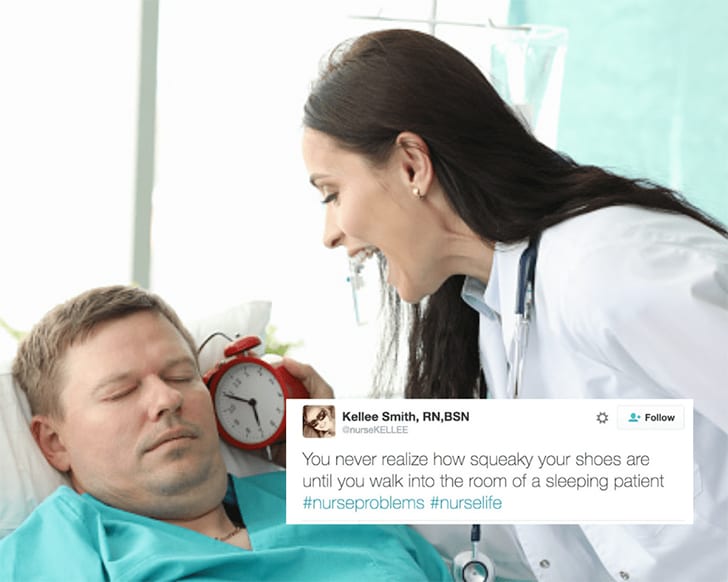
Another misconception most of us have is that patients are usually asleep for the duration of their stay at the medical facility. Nurses are tasked with making sure that patients sleep enough because it is an important part of the recovery process.
Nurses can, however, get in the way of a patient's sleep when doing their general rounds. Their shoes might be squeaky, and it's enough to rouse anyone from sleep. It doesn't help if it happens several times, but nurses have to keep a close eye on their patients at the end of the day.
They Deal With A Heightened Level Of Stress
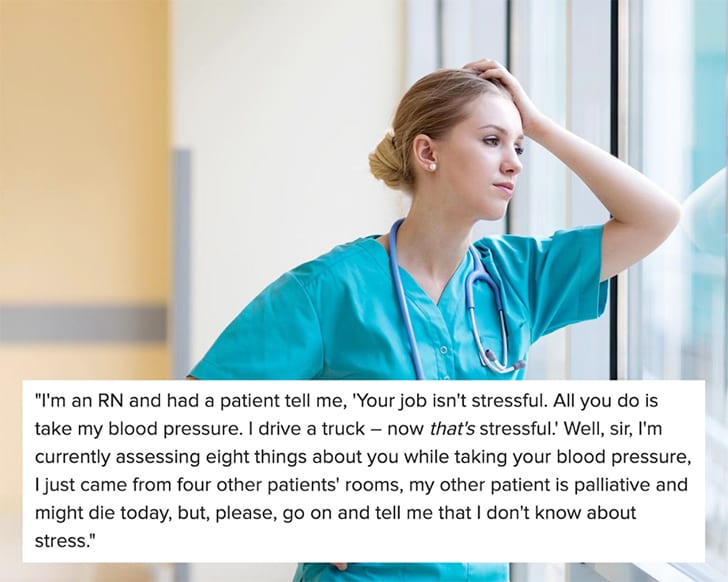
You could say that every job comes with a fair amount of stress, but when it comes to the medical profession, it is heightened. There is the aspect of working hard to save people's lives and the intricacies of handling the day to day care of patients.
Some patients don't see it that way and even tell nurses that their jobs aren't stressful. You don't see what goes on in the mind of a nurse taking a patient's vitals while assessing several things about them based on the readings. They also care on a human level, and losing patients has an impact on their mental health.
Crazy Shifts

Just like every other profession, some days are busier than others in the medical profession. For a nurse, that only means that their shift becomes overwhelmingly busy and it always happens unpredictably.
The number of ambulances arriving at the medical facility can indicate how busy the day will turn out. For a nurse arriving for her shift, it helps prepare them mentally for the busy shift that waits for them. It doesn't ease their mind, but rather, it allows them to make peace with the heavy workload in store.
Friends Want Medical Advice
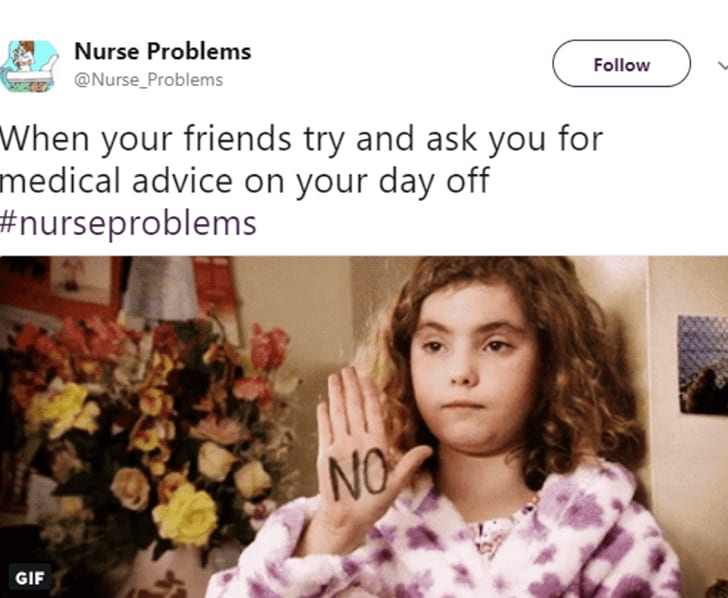
Most of us have been culprits of this one. When we have a friend or family member who works in the medical field we always turn to them for medical advice. While it may be flattering that we consider them our first stop for medical-related concerns, but it can become too much for them.
The rest of us leave our jobs at work but when we bombard friends or family who are nurses with medical questions it doesn't allow them to switch off. It's even worse when we exploit them on their precious days off and it is understandable if they choose not to respond.
They Know When You Are Experiencing Excruciating Pain
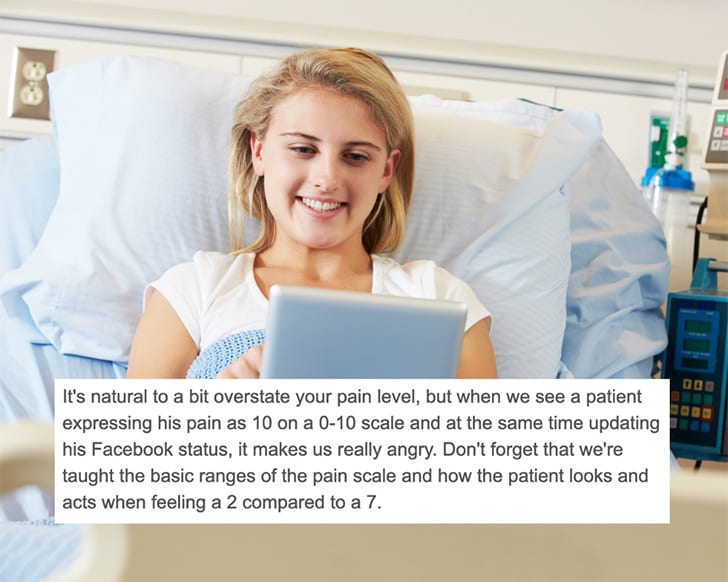
Nurses learn early in their careers how to assess a patient's general state at any given time. The patient's behavior is an indicator of what they are going through whether physically or emotionally. This includes picking up on their facial expressions to figure out their needs.
Patients tend to overexaggerate their pain level to get swift medical care. However, nurses can tell whether or not you are in excruciating pain but sometimes it gets past them. They are never happy when a patient overstated things only for the nurses to realize later on that the patient wasn't in that much pain.
Sweeping Mistakes Under The Rug
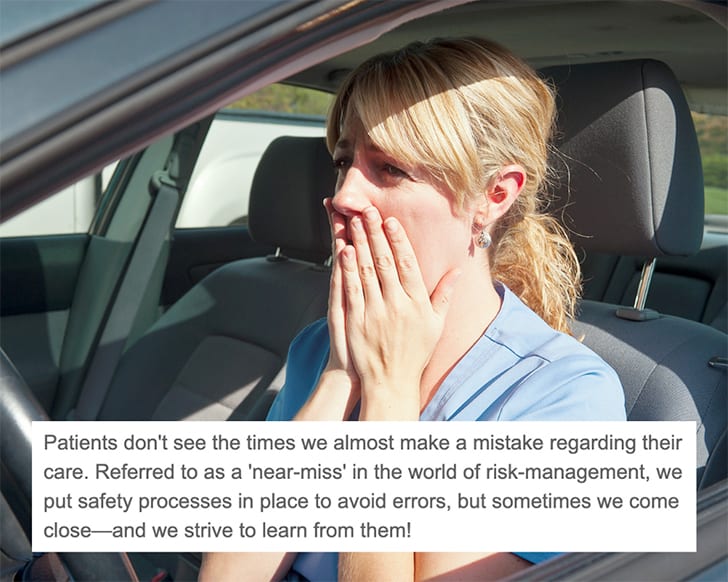
We all make mistakes in the course of duty, but in the medical profession, it could literally mean life or death. It isn't always such costly mistakes, but nurses are only human, and a couple of aspects might fall through the cracks on their watch.
Nurses generally follow a set of safety procedures to make sure that errors are avoided. Mistakes still happen, but they always do their best to fix it before it's too late. However, they won't let the patient know about the 'near-miss because it could aggravate their condition.
Don't Eat Before Surgery
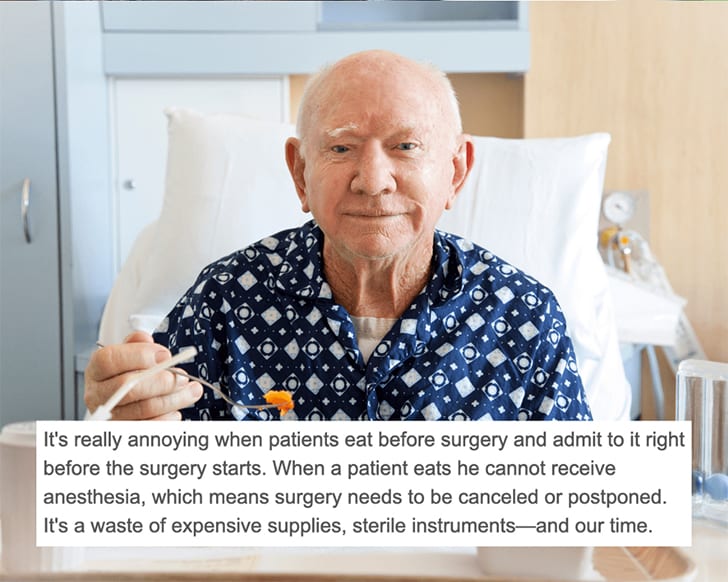
When you think about it, nurses are very patient with the people they care for. They handle people who might be irrational or hell-bent on not following instructions for their own good. Anyone who has had surgery before knows that you are expected not to eat or drink any food if you'll go under general anesthetic.
This is because the anesthetic relaxes the body and temporarily stops functions. It may cause you to vomit or have the food travel back to your throat, which in turn might affect your breathing. Patients who eat before surgeries and admit it when it's too late have to get their procedures postponed or canceled.
A Strained Home Life
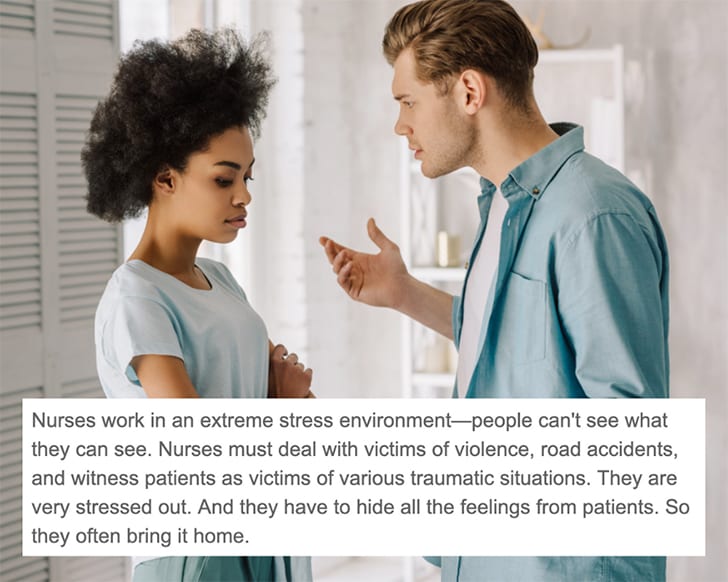
Besides the demands of the job at work, it also affects a nurse's home life. The mental imagery of the patients they deal with from accident victims to people battling chronic illnesses adds to the stress. They also have to keep their emotions bottled up at work, and it's only at home where they get the opportunity to unload it all.
If they have a family that can handle this stress constructively, then it helps their overall wellbeing. Otherwise, nurses might find themselves dealing with trauma, much like the post-traumatic stress disorder soldiers who return from duty battle with.
The Dirt On The Floors
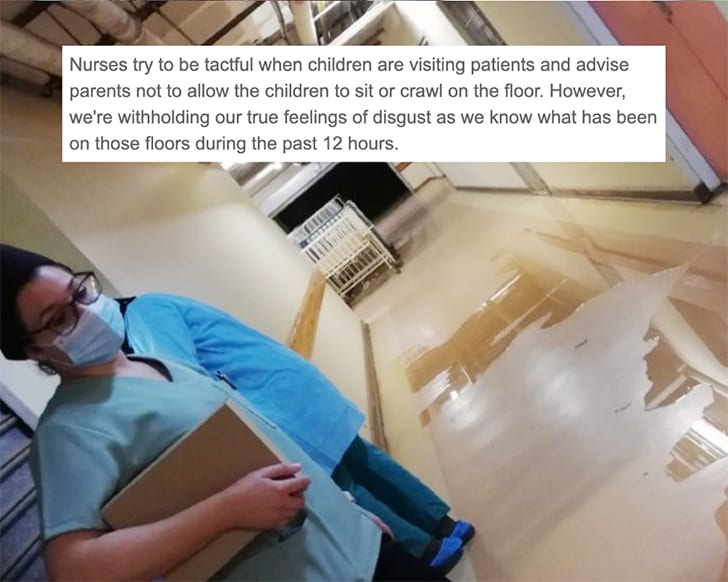
Medical facilities maintain a high level of cleanliness and they do their level best to keep the environment sterile. It is part of their safety protocols, and keeping things clean helps with their patients' recovery.
Nurses still do their best to make sure that children visiting sick relatives do not crawl or sit on the floor. They know what has been on the floor throughout their shift and they wouldn't outrightly tell you, but they'll make sure that you stay clear of the floor. That's why you might hear a nurse almost lose it when they spot a visitor's child on the floor.
A Selfless Profession
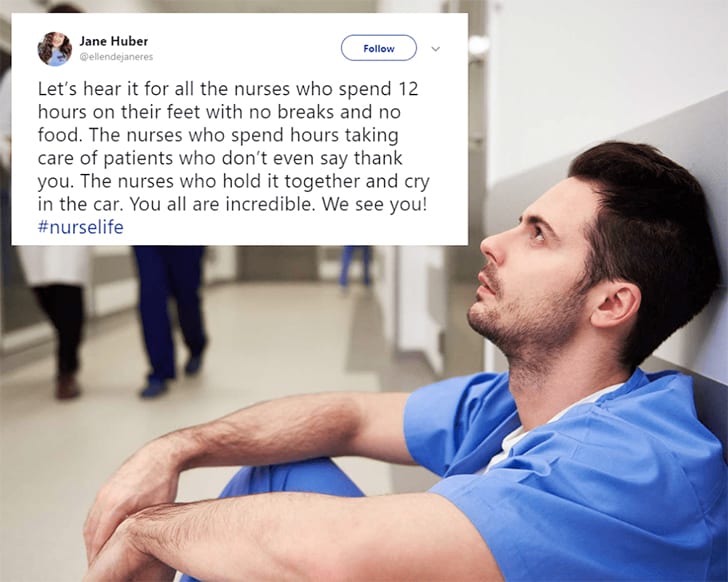
Nurses generally don't receive enough recognition for their selflessness. Physicians receive praise for their role in treating patients, but nurses are mostly overlooked. Nursing is a thankless job, and once patients are healed they generally don't give much thought to the medical staff who pulled through 12-hour shifts to make sure that they recovered.
There are patients who will offer gifts to their patients and even stay in touch long after their discharge. That doesn't happen regularly, and few patients even offer a simple thank you to the nurses who treat them.
